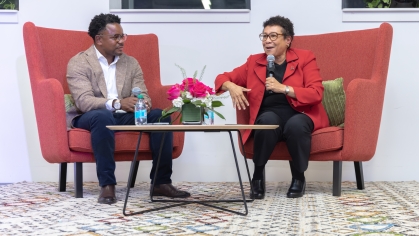Political Science Students Get a Hands-On Lesson in Diplomacy with Model UN Course
An innovative Political Science course is preparing students for the largest intercollegiate Model UN Conference in the world.
Ever wonder what it would be like to be a diplomat? RU-N undergraduates are finding out courtesy of a new Model UN course offered by the Political Science department.
The class, debuting this spring, prepares students to participate in the largest intercollegiate Model UN Conference in the world, with more than 5,000 college and university students from around the globe descending upon New York City April 9–13. The event is organized by the National Collegiate Conference Association.
Model UN Conferences are student-led simulations of UN proceedings, where students act out their roles as country delegates and negotiate during an international crisis.
The RU-N undergraduates are preparing by researching and drafting position papers, sitting on UN committees, negotiating resolutions and treaties, and debating policies and global issues using the language and protocols that real UN ambassadors use. Their assigned country for this year’s conference is El Salvador.
“This course is about as hands-on as it gets, helping students learn vital skills they’ll need to succeed in college, graduate school and the workplace,” says Dr. Amy Higer, one of three instructors teaching the class. “It’s incredibly rewarding to watch these students learn about international diplomacy in a team setting and in such a hands-on way.”
Higer is teaching the course along with Dr. Lynn Kuzma, FASN Associate Dean for Educational Initiatives, who has created and taught Model UN courses at other universities, and Sabrina Axster, a Ph.D. candidate in the Division of Global Affairs, who has worked as a speechwriter and researcher at the UN.
The innovative course has been two years in the making and came about via a confluence of factors. Professor Gabriela Kutting, who is on leave as Chair of RU-N’s Political Science department, had wanted to expand course offerings in global politics as early as 2015, and students started clamoring specifically for a Model UN course. Higer, who teaches classes in global politics, international organizations and U.S. foreign policy, was tasked with developing one.
At a recent afternoon session students worked in small groups, researching the UN’s vast database to find international treaties and resolutions. Teams of four then presented draft versions of their position papers in front of the class and received critiques from the audience and instructors. When done, they broke into small groups once again to continue their research and hone their presentations as the instructors circled the room to consult with them.
“I like the class format because it is a nice change from the typical lecture course, and it feels goal- and team-oriented,” says Kimberly Tayeb, a senior Political-Science major from Dumont, N.J. “It’s helping me get better at articulating arguments and vocalizing them. I'm not used to speaking in front of a group of people. So, it’s great practice.”
In addition to preparing for the conference, the students are studying the theories underlying the creation and role of the UN and other international organizations and tracing the evolution of these institutions over the past century. They’re also learning about the major issues the UN was designed to address: human rights, international security, sustainable development, and, more recently, women’s rights, peacekeeping and environmental preservation.
This contextual knowledge is vital as they take on their roles as UN delegates, though it’s the group exercises they work on in class, such as the UN Security Council simulation they did recently, that are especially helpful in getting them used to the Model UN format.
“I'm looking forward to representing Rutgers at the Model UN conference,” says Tayeb. “I'm really interested to hear how other member states argue their issues at the conference, and working with them on the issues of my committee, the third Committee of the General Assembly.”
That excitement is music to Higer ears. She says the student are working hard and developing multiple skill-sets through this course.
“They’re learning how to analyze international treaties and resolutions, how to take notes on a policy address, how to step into the shoes of a representative from a foreign country and see the world from a different perspective,” she says. “That last skill is extremely important. And it’s just a terrific way to learn to work collaboratively with colleagues.”


